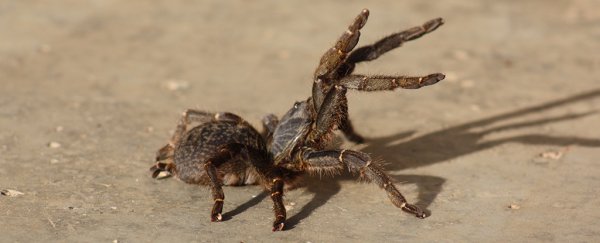If you ever come across a king baboon spider (Pelinobius muticus), which lives primarily in Tanzania and Kenya, keep your distance: Its bite and the associated venom aren't fatal but do produce a lot of pain and itchiness that can last for days.
Scientists think they have worked out why the spider's venom is so potent. Not only could their findings help in the development of treatments for spider bites, but they could also help understand why humans feel chronic pain – and what we can do about it.
The research team carried out a detailed analysis of the venom, breaking it down into its individual parts like you might split up the ingredients of a cocktail. They found a peptide called Pm1a, known to manage responses in a group of sensory neurons called the dorsal root ganglion.
Pm1a plays a role in the brain feeling pain through the central nervous system, and in this case, it seems to be causing pain neurons to keep on firing again and again, leading to the intense reaction from a spider bite.
Tests on mice with a synthesized version of Pm1a confirmed it produced hyperexcitability in nerve cells through three channels – sodium, potassium, and calcium – that all help neurons manage responses to external stimuli, like pain.
"In summary, we show here that a single venom peptide can modulate three major determinants of neuronal excitability," write the researchers in their published paper.
"The coordinated modulation of excitatory and inhibitory ion channels involved in pain propagation may represent an economical and effective defense strategy in pain-inducing defensive venoms."
The presence of Pm1a caused increased sensitivity to pain in the mice through the repeating firing of the neurons registering pain – findings backed up by a mathematical model of the synthetic peptide that the researchers put together, showing how it interacts with nerve cells.
This hyperexcitability shown in the mice is a close match for the hyperexcitability seen in some people with certain types of chronic pain issues, the researchers note, which means this could be a promising avenue to explore when it comes to treating nerve damage.
While there's plenty more to explore here when it comes to the precise details of how P1ma interacts with other mechanisms and chemicals in the body, we now know much more about what makes the king baboon spider bite so painful – and as is often the case, discovering more about our own biology could lead to improved health.
"Detailed studies directed to determine the specific molecular interactions of Pm1a with its many targets may inform the development of pharmacological analogs that could decrease excitability specifically in pain neurons," the researchers told Inverse.
The research has been published in PNAS.
